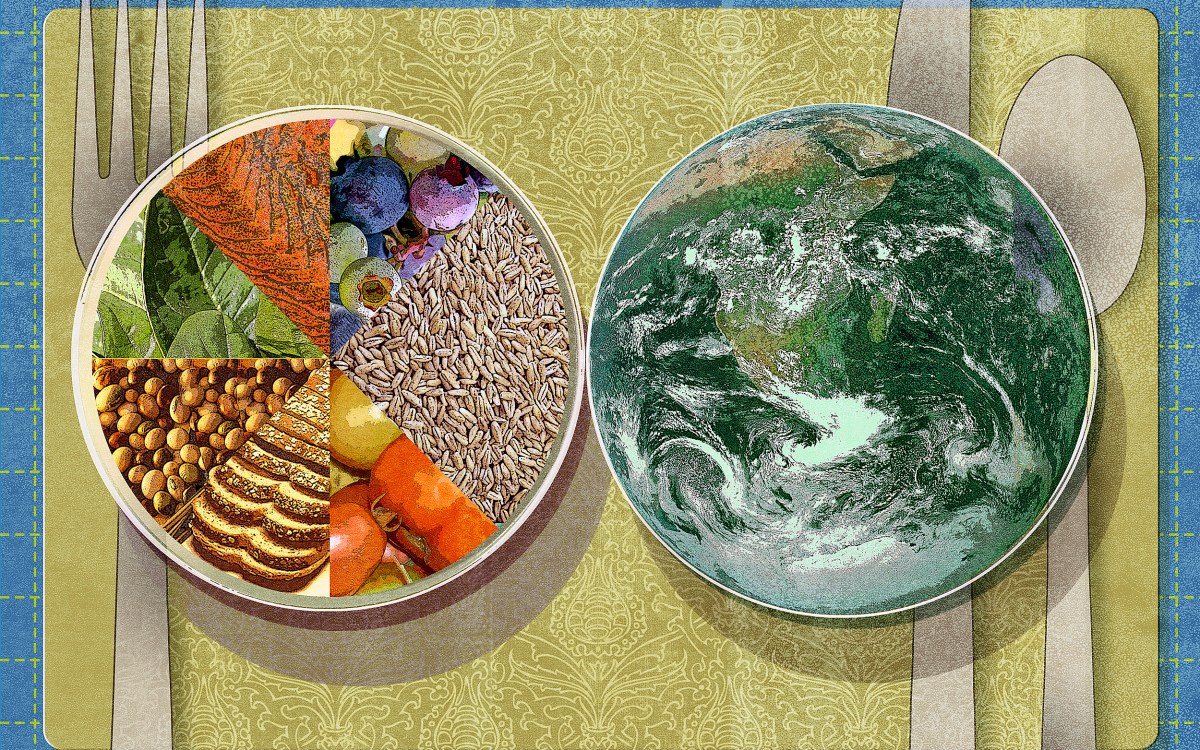
Rose Lincoln/Harvard Staff Photographer
Harvard to cut food-related greenhouse gas emissions
University signs Cool Food Pledge, vowing a 25% improvement by 2030
You are what you eat. And environmentalists know that personal dietary choices affect climate change as well as your personal health because food production accounts for nearly a quarter of greenhouse gas emissions, with animal-based foods taking a greater toll than grains, legumes, vegetables, and fruits.
Today, Harvard took its most recent step toward reducing the climate impacts of food, signing onto the Cool Food Pledge, whose signatories are committed to a group goal of slashing food-related greenhouse gas emissions by 25 percent by 2030, largely by paying attention to menu options. The decision to join this pledge builds on years of collaborative, research-driven sustainable food programming already in place across the University. And it complements a suite of University-wide initiatives aimed at making Harvard fossil fuel neutral by 2026, and fossil fuel free by 2050.
“Addressing the emissions associated with our food choices is a focal part of Harvard’s holistic approach to using our campus as a testbed to address climate change and sustainability,” said Executive Vice President Katie Lapp. “This pledge gives us a common science-based collective target and a way of learning together with institutions around the world as we strive to create a more sustainable food system.”
“Climate change is accelerating, and Americans are the greatest contributors to it because of our diets and lifestyles,” said Walter Willett, professor of epidemiology and nutrition at the T.H. Chan School of Public Health and co-chair of Harvard’s Food Standards Committee, which launched in spring. “Among the many changes we need to make, including a rapid shift to green energy, is a change in diet to a more plant-based way of eating. If we do this right, such changes will also lead to improvements in health and many other aspects of our environment. The actions of every individual are important, but because Harvard intends to be a leadership institution and educates people who will be leaders, steps such as the Cool Food Pledge can be particularly impactful.”
Harvard’s Sustainable and Healthful Food Standards, released in April, were informed by research (including the 2019 report by the EAT-Lancet Commission on Food, Planet, Health spearheaded by Willett) and by existing programs (Menus of Change and the Good Food Purchasing Program). They were developed by a multi-disciplinary faculty committee in partnership with the Office for Sustainability (OFS) with input from the Council of Student Sustainability Leaders and experts in the field. They are designed to increase access for students, faculty, staff, and visitors to sustainable and healthful food offerings, while also enhancing their food literacy, so they have a firmer grasp on the consequences of their food choices.
“Food is arguably the most personal connection between the climate issue and people’s health,” said the Food Standards Committee’s other co-chair Ari Bernstein, who is an instructor in pediatrics at Harvard Medical School, and the director of the Center for Climate, Health, and the Global Environment (C-CHANGE). “People who are concerned about climate focus on questions on what is the least carbon intensive diet, but many more people are going to want to know about the foods that promote their health right now. The good news is that they tend to be aligned.”
Harvard undergraduates and grad students are developing programs to support these food sustainability goals across campus — all as part of Harvard’s Living Lab Initiative, which encourages students, faculty, and staff to think of the campus as place to test innovative solutions to global sustainability challenges.
Junior Meaghan Townsend, a resource efficiency program student coordinator for OFS, created a plant-based eating guide to help her fellow students craft their own diets. Townsend interviewed peers about what they knew about plant-based eating, what their concerns were, and what recommendations they might have for others considering such a diet. A key takeaway: Eating a plant-based diet doesn’t have to be an all-or-nothing proposition. Choosing simply to eat less meat can have a positive impact on your health and the environment. There’s also a section in the guide on athletes who eat plant-based diets to dispel misconceptions that such food choices compromise energy or athletic performance. This point was especially important to Townsend, who rows on the College’s heavyweight crew team.
Resource Program Efficiency Representative Meaghan Townsend ’21 (right) hands out an “Eating Green” guide to a student at last year’s activity fair.
Courtesy of Office For Sustainability

“College students who will be living through the next several decades with whatever climate change looks like have a vested interest in building the best future for themselves,” said Townsend, “and I think plant-based eating is actually one of the most effective, easy, and rewarding ways to do that.”
Aviva Musicus, a fifth-year doctoral student in nutrition at Harvard’s T.H. Chan School of Public Health, worked with OFS and the Nutrition Department to create Healthy Meeting Guidelines for the school. She then got a grant from OFS to pilot a more robust Sustainable Meeting and Event Guide in focus groups with Harvard administrators and students who organize and attend catered events, to better understand their ordering habits and to help make the guide as useful as possible.
“For the past two years, the Office for Student Affairs has invited me to plan the catering for new student orientation in the fall, so that every catered event the entire week adhered to the guide,” Musicus said. “Last year the Harvard Chan School did a big campaign on social media in support of the guide, and showcased its use at orientation. Students loved the sustainable options, especially because at a school of public health it makes sense to practice what we preach.”
Another project, the brainchild of Harvard Chan School postdoc and 2005 College graduate Stacy Blondin, was ver-EAT-tas, a labeling system piloted in the undergraduate houses from fall 2018 until the end of the 2019 academic year that was designed to show students the impact of their food choices on the environment. The project came out of the Climate Change Solutions Fund from the Office of the President, and employed a red, yellow, green-coded system on all foods in Harvard’s dining halls denoting most to least adverse impact on the environment. Blondin says 75 percent of surveyed students would like to continue to see such labels in dining halls so the University Dining Services is working out the details for implementing them.
“Over the past 15 years, I’ve seen a tremendous amount of projects in terms of Harvard’s commitment to sustainability and food systems in particular,” said Blondin. “Harvard is now doing a lot more in terms of sourcing food locally and educating the community on food sustainability. Harvard University Dining Services has been tremendously supportive of ideas to motivate students to eat more sustainably and healthily, and its menu has progressed in terms of its diversity, its representation of different cultures and ethnicities, and with regards to issues around food sourcing and the environmental impacts of food.”
Major food vendors on campus outside of the undergraduate houses, such as Restaurant Associates, Rebecca’s Café, and Rock Café have also been committed to reducing their environmental impact, and have been offering increasingly diverse and delicious plant-based options in their cafeterias and catering operations. On Sept. 28, Harvard will host the “Let’s Talk About Food – Saving the Planet One Bite at a Time” Food Festival on the plaza at the Science Center. The day will include talks on nutrition, wellness, climate concerns, plant-based diets and meat substitutes, demonstrations, and tastings.
Additional signatories announced today by the Cool Food Pledge’s convening organization, the World Resources Institute (WRI), include the World Bank, IKEA, BASF, the University of Pittsburgh, and the City of Ghent (Belgium). According to the WRI, data indicate that if the current signatories collectively hit the 25 percent reduction target by 2030, they will avoid more than 780,000 tons carbon dioxide equivalent of food-related greenhouse gas emissions annually, which is about the same as taking more than 160,000 cars off the road.
Of course, while the principal focus of the pledge is on decarbonization, the Cool Food Pledge includes many mentions of the reality that food sustainability only works when people like what they eat, said Bernstein.
“We’re hard at work to harmonize the quality of the nutrition in the food we serve, its sustainability and its enjoyability, and we look forward to growing our impact, in collaboration with our community members and our fellow Cool Food Pledge signatories, into the future,” he said.








